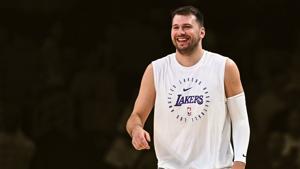Luka Doncic, the esteemed Los Angeles Lakers superstar, is widely recognized for his intense and highly competitive demeanor on the basketball court. This distinct “player personality” has become a hallmark of his game, leading many fans and analysts to assume his fiery disposition extends beyond the hardwood. However, Doncic himself reveals a stark contrast between his athletic persona and his genuine self, offering unique “basketball insights” into the duality of professional athletes.
During games, Doncic embodies the quintessential competitor. He is known for wearing his emotions openly, engaging in spirited trash-talk with opponents and even officials, and playing with an undeniable joy that captivates audiences. This on-court ferocity has solidified his reputation as one of the most formidable “NBA players” in the league, consistently pushing the boundaries of his performance and challenging those around him.
Given his powerful presence in the arena, it’s a natural assumption that this same high-octane individual would dominate in all aspects of life. Yet, in candid interviews, “Luka Doncic” has often emphasized that his public image as a basketball titan is merely one facet of his complex character. This dichotomy is a fascinating aspect of his public and private identity, challenging preconceived notions about athletic intensity.
Away from the roar of the crowd and the pressure of championship contention, Doncic describes himself as “quite the opposite” of his on-court counterpart. His “off-court life” is characterized by a calmer, more reserved, and often more introverted disposition. This personal revelation provides a deeper understanding of the individual behind the iconic jersey, highlighting the separation athletes often maintain between their professional roles and their true selves.
This deliberate separation allows “Luka Doncic” to manage the immense pressures of being an “NBA superstar” and maintain a sense of normalcy. The intense focus and aggressive mindset required for elite competition are tools he employs specifically for his profession, rather than inherent traits that define his entire being. This introspection offers valuable “basketball insights” into how top athletes preserve mental well-being.
The revelation about Doncic’s true “player personality” off the court can shift public perception. For fans primarily exposed to his competitive side through “Lakers news” and game highlights, understanding this private dimension enriches their appreciation of him not just as an athlete, but as a person. It humanizes the larger-than-life figures seen on television, reminding us of their multifaceted existence.
Indeed, “Luka Doncic”‘s experience is not unique among “NBA players.” Many elite athletes often adopt a specific persona tailored for their sport, a kind of mental armor necessary for performing at the highest level. This strategic compartmentalization allows them to thrive under pressure while protecting their private lives and maintaining a distinct “off-court life” that provides balance and respite.
Ultimately, Doncic’s willingness to share this intimate detail about his “player personality” offers a rare glimpse into the complex psychological landscape of professional sports. It underscores that while his on-court intensity makes him a formidable opponent, his genuine self in “off-court life” presents a thoughtful and contrasting individual, further solidifying his unique position in the world of basketball and the broader narrative of “Lakers news.”





Leave a Reply